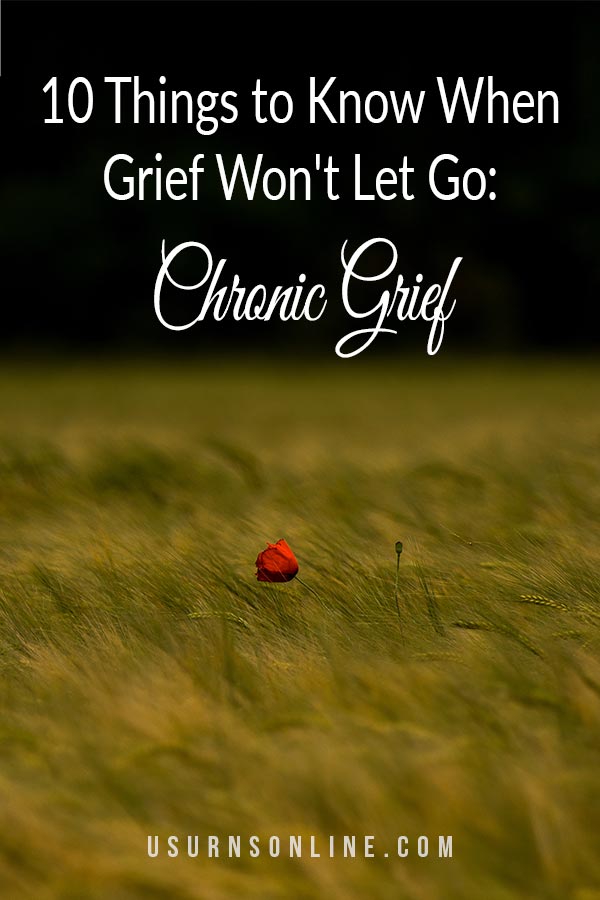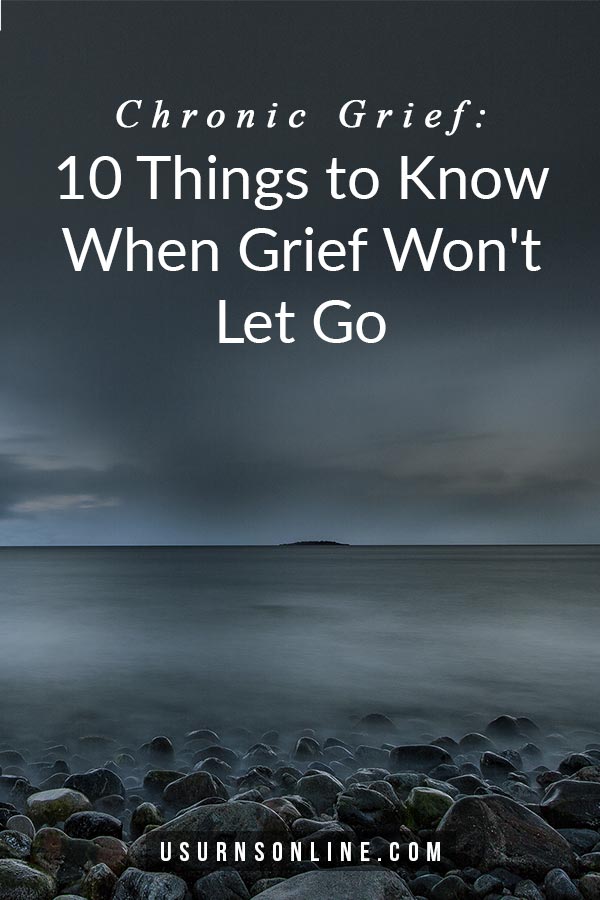Chronic grief isn’t the same as normal grief. This is not a type of grief that you work through easily.
Chronic grief falls under the heading of “complicated grief,” and for very good reason. Please read on to find out more information about this difficult and often debilitating grief.
What is Chronic Grief?
Chronic grief is a strong, overwhelming sadness that doesn’t lessen over time due to the intensity and frequency of thoughts about the deceased.
By way of contract, normal grief will generally diminish with time. The passage of time is usually helpful when grieving, as mourners learn to adjust to life without their loved one.
But when time doesn’t help, what happens to your grief? It simply continues, and wears on your mind, body, outlook, and relationships.
With chronic grief, you may experience extreme grief for a long period of time with an acute focus on your need for the departed one. For instance, parents who have lost a child or someone losing a partner/spouse seem to suffer chronic grief more often than other losses.
Experts believe that this type of grief could be a result of a codependency, as the mourner holds tightly to the memory of the loved one that has passed. This results in a continual reliving of promises made (like being true to each other), being caught up in excessive thoughts of how the death occurred, or by completely avoiding everything associated with the death.
Typically, anyone who grieves says they truly never get over it, but you learn to live differently. With chronic grief, the healthy, healing change does not occur.
But here’s the good news: chronic grief can be treated.

What Is the Difference Between Chronic Grief and Prolonged Grief?
Determining the differences between chronic grief and prolonged grief and which type you are suffering from may be a challenge. They both refer to grief that lasts an atypical amount of time.
Urns Made in the USA
The difference is that chronic grief results when the survivor has a powerful codependence on the deceased and feels as if they cannot take on any of the responsibilities of life now that they have lost their loved one.
In contrast, prolonged grief refers to grief symptoms that have continued to be very intense for more than 12 months after the loss. Prolonged grief is considered a disorder and is distinguished from other types of grief. In doing this, doctors feel they can treat it more effectively.
How Long Should Grief Last?
There is no set time for how long grief should last. No one can tell you how to grieve or how long it should take you. We all grieve differently. You are not only grieving the present loss, but you will grieve for the past that you shared and for the future that you won’t share.
Society usually puts a twelve-month target date for grief. Don’t worry about meeting it. The main thing to do is work through your grief in your own time. Strive to recover a healthy and happy outlook on life.
Normal grieving is a healthy response to the loss you are going through. Working through that grief is a must, and will keep you from the more difficult chronic forms of grief.
How Long Is Too Long to Mourn a Death?
Again, there is no set time. Friends and family may tell you it is time to move on or get over it. Don’t let anyone tell you to rush through your grief. Honoring your grieving and personal time is important.
Feeling trapped in the vicious cycle of mourning and seeing no way out may be a signal to get professional help.
The length of your mourning period depends on numerous things:
- The type of loss. Was it a death? The loss of a relationship? A dream that won’t come true? The loss of a pet? The loss of a pregnancy? Divorce? Job loss? Health problems?
- Your age. Losing someone you love at a young age, in your teen years, early adulthood, middle age, and old age will each affect you in different ways.
- The age of your loved one. All loss is hard, but there is clearly a difference between “he was so young” and “she was ready to go.”
- Your personality type. Each person will process grief in their own way.
- The type of death. Expected death? Unexpected? Violent or accidental? Long, drawn-out illness or rapid decline?
10 Things to Know About Chronic Grief
Keep in mind that there is no single right way to grieve. We are all individuals and react differently to situations. Continue reading to find out some valuable tips and information to know about chronic grief. You might even recognize yourself somewhere in the next few paragraphs.
1. It is important to let yourself grieve.
Holding onto your grief, or ignoring it will not make it go away or make it any easier. This is the wrong way to face grief and the right way for it to evolve into chronic grief.
2. Chronic grief can make you feel like you are in a constant state of grief and anxiety.
You may find that you are not getting any reprieve from your grieving. It may be helpful to start journaling and recognizing some triggers. Writing can be very cathartic and may help you organize your thoughts and feelings.
3. You may feel like isolating yourself from social contacts.
This might be OK at first, for a season. But ultimately when you share your burden of grief with others, it will help you sort out your feelings and work through your grief. Sharing your grief with friends and family (who are also grieving the same loss as you) can be very beneficial. This may help all of you to cope better.
4. Centering your thoughts exclusively on your loved one and only focusing on the loss is nonbeneficial.
This will only keep you in grief longer than necessary. Try to refocus your thoughts on working through this very difficult time.
Now may be a good opportunity to start something new in your life. Consider taking up a new hobby or new pet for example.
5. Chronic grief can be spurred on by the sudden loss of a loved one.
Chronic grief may be caused by a violent death or a death that was unexpected. Try not to dwell on the “death” itself.
I know, easier said than done. But try to make a conscious effort to focus on something else. Again, this is why it is a good idea to start a new hobby or activity in your life.
6. Chronic grief seems to occur more frequently in older women and in the loss of someone close to you.
If you fit into this category, watch yourself for symptoms of chronic grief. Take care of yourself. This should be your number one priority right now. It is ok to be a little self-focused – some might even say selfish – for a season.
7. If you have any history of mood or anxiety disorders, you may be more susceptible to chronic grief.
Remember, it is not a show of weakness if you decide you need professional help. It takes courage to share your most intimate thoughts and feelings.
8. Remember that your life can be fulfilling and happy once you have worked your way through your grief.
The knowledge of a better future can help you break free from feeling the deep grief from which you have been suffering. Life can be lived abundantly again.
9. Thoughts of suicide may be plaguing your mind.
Find help immediately. The National Suicide Helpline is available 24 hours a day. Please call 1-800-273-8255
10. You may be suffering from guilt, anxiety, heart palpitations, loss of appetite, loss of sleep, anger, and depression.
It is important to know where you are in the process of your grief. Recognize that help is just a phone call away. Google “grief counseling,” you will see that professional help is easy to find and easily accessible.
With today’s technology, you don’t even have to leave the comfort of your own home to enjoy the benefits of face to face counseling.
What Are Some Other Kinds of Grief?
Yes, unfortunately there are many forms of grief and eventually we will all go through at least one of them. Grieving is a normal part of life.
If you are interested in learning about the different types of grief, please read our article on The 16 Types of Grief.
Read Next: Traumatic Grief
Pin It





